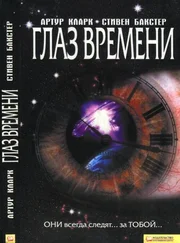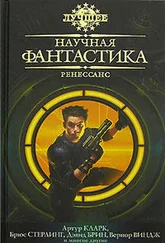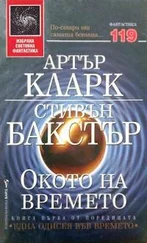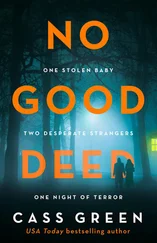Стивен Бакстер - The Good New Stuff
Здесь есть возможность читать онлайн «Стивен Бакстер - The Good New Stuff» весь текст электронной книги совершенно бесплатно (целиком полную версию без сокращений). В некоторых случаях можно слушать аудио, скачать через торрент в формате fb2 и присутствует краткое содержание. Год выпуска: 2002, ISBN: 2002, Издательство: St. Martin's Griffin, Жанр: Фантастика и фэнтези, на английском языке. Описание произведения, (предисловие) а так же отзывы посетителей доступны на портале библиотеки ЛибКат.
- Название:The Good New Stuff
- Автор:
- Издательство:St. Martin's Griffin
- Жанр:
- Год:2002
- ISBN:0-312-26456-9
- Рейтинг книги:3 / 5. Голосов: 1
-
Избранное:Добавить в избранное
- Отзывы:
-
Ваша оценка:
- 60
- 1
- 2
- 3
- 4
- 5
The Good New Stuff: краткое содержание, описание и аннотация
Предлагаем к чтению аннотацию, описание, краткое содержание или предисловие (зависит от того, что написал сам автор книги «The Good New Stuff»). Если вы не нашли необходимую информацию о книге — напишите в комментариях, мы постараемся отыскать её.
The Good New Stuff — читать онлайн бесплатно полную книгу (весь текст) целиком
Ниже представлен текст книги, разбитый по страницам. Система сохранения места последней прочитанной страницы, позволяет с удобством читать онлайн бесплатно книгу «The Good New Stuff», без необходимости каждый раз заново искать на чём Вы остановились. Поставьте закладку, и сможете в любой момент перейти на страницу, на которой закончили чтение.
Интервал:
Закладка:
"Are we Enlightened?" The Incarnation's voice was mild. "Or are we not? Is the Buddha's truth eternal, or is it not? Do you not support the Doctrine?"
Daddy Carbajal threw himself down beside Jigme. "I believe, Omniscient! I will do as you ask!"
"Leave us, then. Kyetsang and I wish to be alone."
Certainty seized Jigme. He could feel tears stinging his eyes. "Let me stay, Omniscient!" he cried. "Let me die with you!"
"Carry these people away," said the Incarnation. Hands seized Jigme. He fought them off, weeping, but they were too powerful: he was carried from the burning pavilion. His last sight of the Incarnation was of the Gyalpo Rinpoche and Kunlegs embracing one another, silhouetted against flame, and then everything dissolved in fire and tears.
And in the morning nothing was left, nothing but ashes and the keening cries of the traitor O'Neill, whom the Bodhisattva in his wisdom had sent forever to Hell.
Jigme found!urq there, standing alone before O'Neill, staring at the figure caught in a webwork of life support and nerve stimulators. The sound of the traitor's endless agony continued to issue from her torn throat.
"There will be no war," Jigme said.
!urq looked at him. Her stance was uncertain.
"After all this," Jigme said, "a war would be indecent. You understand?"
!urq just stared.
"You must not unleash this madness in us!" Jigme cried. Tears rolled down his face. "Never, Ambassador! Never!"
!urq's antennae twitched. She looked at O'Neill again, rotating slowly in the huge wheel. "I will do what I can, Rinpoche," she said.
!urq made her lone way down Burning Hill. Jigme stared at the traitor for a long time.
Then he sat in the full lotus. Ashes drifted around him, some clinging to his zen, as he sat before the image of the tormented doctor and recited his prayers.
Maureen F. McHugh
THE MISSIONARY'S CHILD
Born in Ohio, Maureen F. McHugh spent some years living in Shijiazhuang in the People's Republic of China, an experience that has been one of the major shaping forces on her fiction to date. Upon returning to the United States, she made her first sale in 1989, and has since made a powerful impression on the SF world of the nineties with a relatively small body of work, becoming a frequent contributor to Asimov's Science Fiction, as well as selling to The Magazine of Fantasy & Science Fiction, Alternate Warriors, Aladdin, and other markets.
Not prolific by the high-production sausage-factory standards of the field, McHugh has nevertheless enjoyed the distinction of publishing some of the very best stories of the late eighties and nineties, especially such profound and disturbing stories as "Protection," "Nekropolis," and "The Lincoln Train," which won her a Hugo Award in 1996, although even her "second-string" stories such as "Baffin Island," "The Queen of Marincite," "Whispers" (with David B. Kisor), "In the Air," "The Beast," and "A Coney Island of the Mind" would be the envy of many another writer. Many of these stories take her into territories far beyond the range of the Planetary Adventure, but she can write those too when she sets her mind to it, as well or better than it's ever been done by anybody, as shown by stories such as "Strings," the recent Nebula finalist "The Cost to Be Wise," and the suspenseful, sly, and sardonic adventure that follows, "The Missionary's Child," a story with strong echoes of Ursula K. Le Guin, Joanna Russ, James Tiptree, Jr., and others, but one which demonstrates a voice and vision that are McHugh's alone. A story that shows us that sometimes even when you are determinedly minding your own business, it's hard to stay out of trouble… and that sometimes it's when you're not looking for anything that you find something that's the most worth finding….
Although she's expert at shorter lengths, much of McHugh's reputation has been made with her novels. In 1992 she published one of the year's most widely acclaimed and talked-about first novels, China Mountain Zhang, which won the Locus Award for Best First Novel, the Lambda Literary Award, and the James Tiptree Jr. Memorial Award, and which was named a New York Times Notable Book as well as being a finalist for the Hugo and Nebula awards. Her most recent book, the novel Half the Day Is Night, received similar critical acclaim. Upcoming is a new novel, Mission Child, set on the same world as "The Missionary's Child" and "The Cost to Be Wise." She lives in Twinsburg, Ohio, with her husband, her son, and a golden retriever named Smith.
"Are you blind?" the woman asks.
I'm looking right at her. "No," I say, "I'm foreign."
Affronted, the woman straightens up in a swirl of rose-colored robe and chouli scent, clutching her veil. Here in the islands, they don't see very many blond-haired, blue-eyed barbarians; people have asked me if I can see normally, if all northerners are blue-eyed. But this is the first time someone has ever asked me that. Maybe she thinks that my eyes are filmed, like the milky-white of old people.
She thought I was begging— I must look pretty tattered. I should have said yes, then I could go get something to drink, get out of the sun. I'm sitting down by the water. I'm broke, and I've been hungry for awhile, and I'm listless and a little stupid from the heat and lack of food. I feel fifty instead of thirty-one.
I should go back to the hiring area, wait around with a couple of other thugs for some sort of nasty work. I should oil my sword. It's a waste of time; no one needs a mercenary here, the Celestial Prince doesn't hire foreigners in his army.
But I don't want to go back. Up in the market, some yammerhead had been rattling on about our Cousins from the stars. The Cousins haven't come to the islands in any numbers yet, and I'll wager he's never met any. Listening to this stonker gave me a headache. Wouldn't he be surprised if he knew that the Cousins think of us all about the way the woman who asked me if I was blind thinks of me. They think that we're barbarians. They think that we're stupid because we call what they do magic instead of science.
Or they feel sorry for us.
I know better than thinking bitter; time to head back to the market, see if anybody will hire a tokking foreigner to dig ditches or something.
But I sit, my head aching with hunger and heat, too stupid to do anything about it. And I'm still sitting there a dine later, the sun is still high in the sky baked the color of celedon. Not awake, not asleep.
I'm going to have to start selling my gear, the slow road to starvation.
I open my eyes and watch a ship come in on the deep green sea. It has red eyes rimmed in violet and violet sails; from far away, I can see a person wearing dark clothes that are all of one piece. A Cousin, standing at the prow. On the boathouse there is a light, star-magic, like a third eye, blind and white. Here in the islands, when you see Cousins, they are with the rich and the powerful.
What would the Cousin think if I spoke a little of his/her language? I only remember a few phrases. "Hello," "My name is," and a phrase from my lessons, "Husband and wife Larkin have three children, a boy and two girls." Would the Cousin be curious enough to take me aboard? Recognize the debt for what the Cousins did to my kin, help me get back to the mainland?
The ship docks, three guildmen and a Cousin disembark, and come down the quay. Southerners will stare at any foreigner, but they stare double at a Cousin, and who can blame them? The Cousin is a woman, with her hair uncovered, dressed like a man, but not looking like a man, no. That amuses me. Southern women pull their veils around their mouths and stop to watch.
She comes down the quay with studied indifference. I can understand that; what does one do when people stare day after day? Pretend not to notice.
Читать дальшеИнтервал:
Закладка:
Похожие книги на «The Good New Stuff»
Представляем Вашему вниманию похожие книги на «The Good New Stuff» списком для выбора. Мы отобрали схожую по названию и смыслу литературу в надежде предоставить читателям больше вариантов отыскать новые, интересные, ещё непрочитанные произведения.
Обсуждение, отзывы о книге «The Good New Stuff» и просто собственные мнения читателей. Оставьте ваши комментарии, напишите, что Вы думаете о произведении, его смысле или главных героях. Укажите что конкретно понравилось, а что нет, и почему Вы так считаете.











